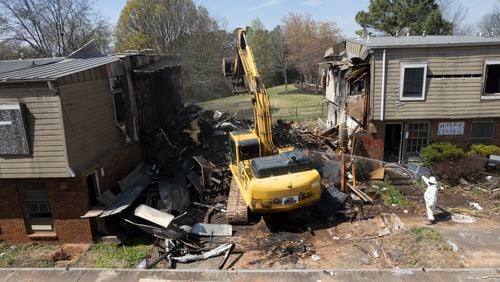It was difficult to watch former residents of Forest Cove Apartments pleading for help from Atlanta City Council members several weeks ago. The dilapidated, crime-ridden complex where they once lived was condemned by a municipal judge in 2021, and they had to leave.
For residents who haven’t found a safe place to land yet, the deadline is approaching to use the vouchers that will help them pay for their new residences. Some of the former tenants complained they had been given little assistance from the relocation services organization retained by the U.S. Department of Housing and Urban Development.
For some of those who have found new homes, life is no better. One resident after another stepped up to the microphone and tearfully recounted how equally difficult, if not more difficult, their lives have been since leaving the deplorable conditions at Forest Cove. They still reside in blighted places with mold, rodents and violence. But now, many of them have been relocated in areas outside of the city, such as Lithonia and Stockbridge, where they are miles away from jobs, schools and support systems.
Though the Forest Cove complex is not owned, subsidized or controlled by the city of Atlanta, city officials have attempted to assist families in relocating and have promised to create a path for residents to return to Thomasville Heights after a new affordable housing complex is built. Mayor Andre Dickens said he hopes to have a developer for the new site in place by the end of the year.
But Dickens also suggested during an April press conference that, with the HUD vouchers, the former residents had a choice in where they wanted to go. “They used to be confined to Forest Cove. … Now they have a document that we negotiated with the federal government, with HUD, that now they can go anywhere they want to go.”
I understand the spirit in which the Mayor made this statement. And I know he didn’t mean this literally — because, when you are poor, your choices are so limited that they almost seem like no choices at all.
We all know that, no matter what housing choice these residents may wish to make for themselves and their families, plenty of people — such as, the landlords who refuse their housing vouchers — will make choices for them.
As former Forest Cove resident Aryan Tucker, 33, shared with the Southern Poverty Law Center earlier this year, “When you put on applications that you lived there, they automatically assume that you are trash because the apartments were trash.”
I’ve never lived in a place like Forest Cove. Not even close. But I have lived in a place where air conditioning didn’t work and the temperature in the rental was stuck at 83 degrees; water flooded from the top of the toilet whenever I flushed it; and a strange odor hung in the indoors air. Weeks after I moved into the southeast Atlanta complex, a teen was shot and killed on the property.
Over the year and a half that I was there, I dealt with mold and insect infestations, and I continually had to ask, or rather beg, for a reasonable standard of living. I got a glimpse of how stressful and exhausting it can be to worry about your health and well-being in a space that should be a place of comfort — home.
I couldn’t wait until the time came to move out of the complex. I stayed for as long as I did to save money for the down payment on a house. The only thing that helped me endure was knowing that I could leave. I had real choices.
This is why it was so hard for me to listen to the stories of Forest Cove residents. This is why I am writing this column, even though I don’t know what new solutions can be offered to remedy the city’s lack of safe and affordable housing.
For some Forest Cove residents, this wasn’t their first time being displaced from one crappy apartment and moved into another. In 2010, when a subsidized complex in Thomasville Heights was demolished, some of those residents moved into Forest Cove, which had already started racking up code violations. It was just one of more than 250 unsafe and unhealthy housing complexes revealed in The Atlanta Journal-Constitution’s 2022 Dangerous Dwellings series.
In 2023, the city launched the Safe and Secure Housing program. Seven new code enforcement staff were hired, and private attorneys were contracted to take negligent landlords to court. The city has taken enforcement and oversight action against 27 properties citywide, according to a recent analysis from Atlanta Civic Circle.
Some apartment complexes have been restored to livable standards. Some that were restored have since fallen back into noncompliance. Some are still languishing.
So what do we do?
We keep building affordable housing.
We keep insisting on a court system that prioritizes tenant rights.
We push federal and local housing officials to financially penalize negligent landlords by reducing or eliminating public funds or tax credits.
We do these things and more, and we keep doing them, all at the same time, even when they seem daunting.
That’s how we can better protect and support people who don’t always have choices.
Read more on the Real Life blog (www.ajc.com/opinion/real-life-blog/) and find Nedra on Facebook (www.facebook.com/AJCRealLifeColumn) and Twitter (@nrhoneajc) or email her at [email protected].







